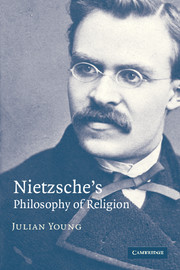Book contents
- Frontmatter
- Contents
- Acknowledgements
- List of abbreviations
- Introduction
- 1 Schopenhauer and ‘Man's Need for Metaphysics’
- 2 The Birth of Tragedy
- 3 Untimely Meditations
- 4 Human, All-too-Human
- 5 The Gay Science
- 6 Thus Spoke Zarathustra
- 7 Beyond Good and Evil
- 8 On the Genealogy of Morals
- 9 The Wagner Case
- 10 Twilight of the Idols
- 11 The Antichrist
- 12 Ecce Homo
- 13 Epilogue: Nietzsche in history
- Bibliography
- Index
10 - Twilight of the Idols
Published online by Cambridge University Press: 27 October 2009
- Frontmatter
- Contents
- Acknowledgements
- List of abbreviations
- Introduction
- 1 Schopenhauer and ‘Man's Need for Metaphysics’
- 2 The Birth of Tragedy
- 3 Untimely Meditations
- 4 Human, All-too-Human
- 5 The Gay Science
- 6 Thus Spoke Zarathustra
- 7 Beyond Good and Evil
- 8 On the Genealogy of Morals
- 9 The Wagner Case
- 10 Twilight of the Idols
- 11 The Antichrist
- 12 Ecce Homo
- 13 Epilogue: Nietzsche in history
- Bibliography
- Index
Summary
‘Medical’ in character, like nearly all of Nietzsche's thinking, the reflections in Twilight respond to, and arise out of, a diagnosis of the ills of modernity, out of ‘cultural criticism’. Many earlier themes reappear: we live in an Erlebnisgesellschaft – German students drink too much beer (TI viii 2) – we have become a ‘machine-minded’ (TI ix 37) society capable of finding stress-relief only at seaside resorts and Bayreuth (TI ix 29–30), and so on. Over and above these relatively random hits, however, is a central theme focused on the word ‘democracy’, which, for Nietzsche, is a synonym for ‘décadence’.
THE DECADENCE OF DEMOCRACY
For all that Plato is his great antagonist, Nietzsche never escapes his profound influence. (The four most frequently discussed figures in his published works are Wagner, Goethe, Schopenhauer and Plato. Aristotle comes twenty-first on the list, after, inter alios, Epicurus, Sophocles and Aeschylus, which speaks volumes about ‘What I owe the Ancients’ – the title of Twilight's section x.)
In the Republic, Plato famously holds that state and soul are structurally the same, that they stand to each other as macrocosm to microcosm. And he also famously holds that democracy in the soul (a condition in which all the instincts are given equal weight) and democracy in the state (the world of, as Nietzsche puts it, ‘equal rights’) are conditions of decadence. The reason the democratic soul is decadent is that it is incapable of focused and concerted – ‘long-willed’, Nietzsche would say – action.
- Type
- Chapter
- Information
- Nietzsche's Philosophy of Religion , pp. 161 - 176Publisher: Cambridge University PressPrint publication year: 2006



